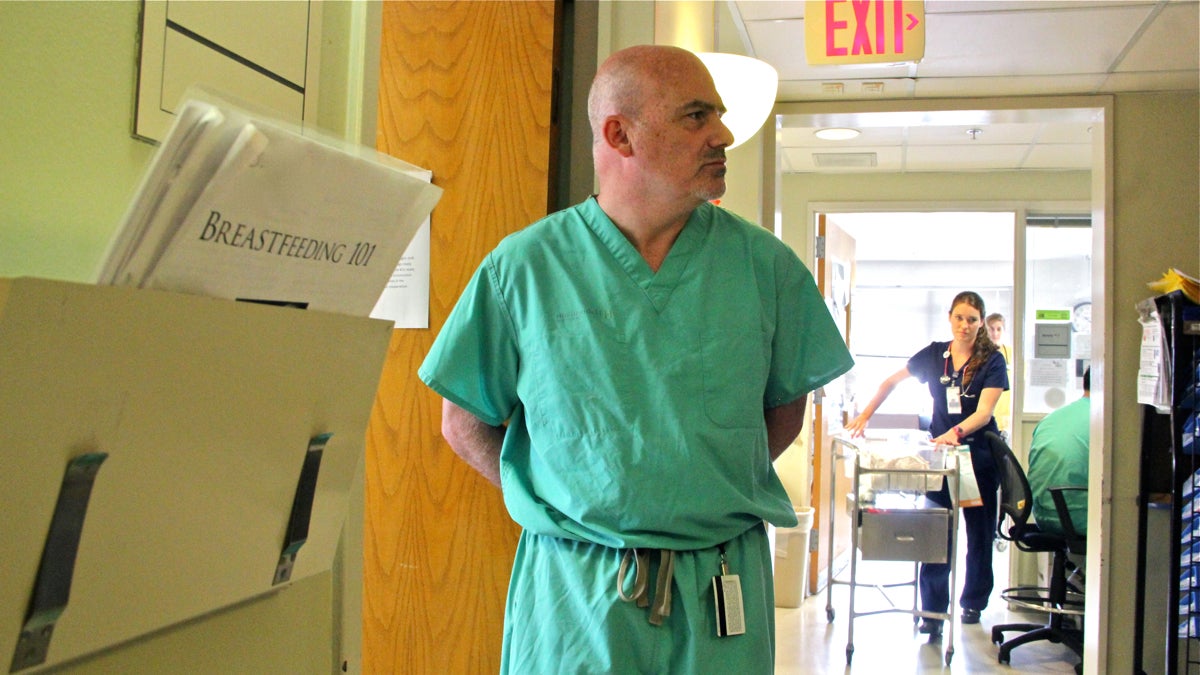For new moms, formula bag no longer a given at Philadelphia hospitals
Listen
Dr. Dan Guilfoil, director of labor and delivery at Hahnemann, says the hospital has taken a number of steps to encourage breastfeeding, including a ban on goodie bags from formula companies. (Emma Lee/WHYY)
All of Philadelphia’s major birthing hospitals have stopped giving out discharge bags with formula in it to new moms. The city joins about a quarter of hospitals nationwide in going ‘bag free.’ The move, brought by a citywide task force including members from all six hospitals, is part of a nationwide push to encourage breastfeeding.
Public health advocates, including those with the American Academy of Pediatrics and the World Health Organization, tout the long-term health benefits of breastfeeding for both a mother and her infant, especially within the first six months of life, but breastfeeding becomes a lot harder if a mom uses formula within those first few days and even hours.
Formula companies supply hospitals with their branded tote bags. Advocates say giving a new mom, newborn in tow, a formula bag sends a mixed message, and it increases the likelihood that she’ll use the formula.
Banning discharge bags with formula “is certainly not to make moms feel guilty because their choice is to formula feed that baby,” said Katja Pigur, a co-facililitator of Philadelphia’s task force and specialist with the Maternity Care Coalition. “This is just because we know that women who come to the hospital that actually want to initiate breastfeeding, they are encountering many barriers.”
Pennsylvania Hospital stopped giving formula bags several years ago, while others came on board more recently. The Hospital of the University of Pennsylvania and Thomas Jefferson Hospital stopped the practice in 2012. Einstein followed suite in October 2013, according Pigur. Hahnemann University Hospital stopped giving out discharge bags with formula in February.
“I think we made the assumption that people would be more attached to the bags than they are,” said Dr. Dan Guilfoil, director of labor and delivery at Hahnemann.
Guilfoil credits the support from other city hospitals and that of a St. Christopher’s Hospital pediatrician in helping to transform their whole culture around breastfeeding. Training staff, from nurses to residents, in how to approach the topic of breastfeeding in a positive way with expecting and new moms, he said, has made a huge difference.
“Before we used to ask people, ‘do you want to breastfeed or bottlefeed?’ As if they were equivalent things. And now we ask people, ‘are you going to breastfeed?’ And that change in attitude gives a different signal to patients.”
Dr. Gail Herrine, director of Temple’s postpartum unit, said the hospital changed its formula bag practice in January.
“We anticipated that patients would be disappointed in not receiving the bags, and there was often discussion over the years about, if we get rid of the bags then patients will go to other hospitals to get the bag,” she said. “So the fact that all the hospitals together got rid of the bags makes it so that there’s no competition. We’re all in this together.”
Neither Herrine nor Guilfoil report experiencing any pushback from patients about the new policy. Formula is still available to moms who request or need it.
The trade group, the International Formula Council, states the new policies detract from the real problems new moms face, like access to health care. Herrine says additional pressure to encourage breastfeeding is coming down from the main hospital accreditation agency, the Joint Commission. She says in January it started requiring that hospitals collect their exclusive breastfeeding rates. Temple’s rate is around 15 percent.
Herrine says breastfeeding becomes a lot harder if a mom uses formula early on and even if she intends to breastfeed, she’s less likely to do so if given a bag with formula when leaving the hospital.
“Giving bottles here and there because you’re having a perceived low supply problem may lead to problems with breastfeeding down the line,” says Herrine. “If you give the baby the formula bottle here and there, the baby’s not incentivised to suck and help the mom make more milk.”
Herrine says breastfeeding is just hard at first. A baby may not take that much milk, and a mom may experience difficulty lactating. Down the road, that can be compounded by socioeconomic factors, work schedules and ability to pump. But that’s why she and others say the new bag policy is just one part of a broader effort to set moms up for success with breastfeeding.
Deborah Davis, a nurse educator at Hahnemann, points to the hospital’s shift about a year and a half ago to offering skin-to-skin time between the mother and baby immediately after birth, instead of whisking the newborn away to be weighed and bathed, as one factor in the increasing number of moms breastfeeding at the hospital.With that skin-to-skin time right after delivery, “the baby does a natural crawl to the breast … the baby will literally find the breast on his own,” she said. “So we’ve had many mothers who are like ‘Wow, this [breastfeeding] is great. I want to do this!”
Last week, the hospital also started initiating efforts to keep the mom and infant together at all times. Such actions, Davis and others say, encourage bonding and breastfeeding before a mom even leaves the hospital … with or without a bag.
WHYY is your source for fact-based, in-depth journalism and information. As a nonprofit organization, we rely on financial support from readers like you. Please give today.

